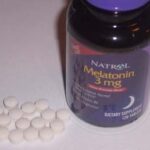Lack of sleep can significantly affect your performance at work and in your personal life, and no one likes to have a sleepless night. For bouts of occasional sleeplessness, over-the-counter sleep aids are available. Some of these sleep aids just contain herbal supplements like melatonin and valerian root, but most over-the-counter sleeping pills contain a medicinal active ingredient. Common sleeping pills that fall into this category are Nytol, Unisom, and Tylenol P.M. All of these OTC sleep aids contain an antihistamine that is known for inducing drowsiness, and these antihistamines are generally considered safer and less habit forming than prescription drugs like Ambien and Lunesta.
Among the over-the-counter sleeping pills, one of two antihistamine ingredients is used: diphenhydramine (sometimes listed as diphenhydramine hydrochloride) or doxylamine succinate. Diphenhydramine is the ingredient most frequently used, and is found in most formulations of Tylenol P.M. and Nytol. Most people report feeling drowsy after a normal dose of diphenhydramine, although this drowsiness can range from very slight to incredibly pronounced. Many people require just one dose to be able to fall asleep, although some people need a second dose in order to be able to sleep on some evenings. Diphenhydramine is eliminated quickly, and most users don’t experience any lingering grogginess from the medicine the next day. Tolerance to this particular antihistamine builds up quickly, though, and it loses it’s effectiveness as a sleep aid after just a few nights of repeated use.
Doxylamine succinate, on the other hand, is one of the most sedating antihistamines available over-the-counter, and a single dose causes rapid and marked drowsiness in the vast majority of individuals. Doxylamine succinate is eliminated somewhat more slowly from the body than diphenhydramine hydrochloride, so while it will help you stay asleep longer, it may have somewhat of a “hangover” effect the next day. Unlike diphenhydramine, most people don’t develop any tolerance to the sedating effects of doxylamine succinate, so it may be a better choice for people who need to use an OTC sleep-aid more frequently.
Diphenhydramine tends to be cheaper than doxylamine succinate, and the lack of hangover effects makes it an ideal first-choice for those who have never used an OTC sleep aid. If, however, a diphenhydramine sleeping pill doesn’t seem to cure your insomnia, you may want to give a doxylamine succinate based pill a try. Over-the-counter sleep aids shouldn’t be used for longer than 2 weeks, and if your sleeplessness lasts longer than that, you’ll want to see a doctor as it could be a sign of a more serious medical condition. For most people, though, one of the two antihistamine-based medicines covered here should solve most sleep problems. Store brand sleeping pills contain the same active ingredients as the brand name versions, so you can usually save money by looking for a generic alternative. For more information about diphenhydramine and doxylamine succinate, check out the links listed in the resources section of this article.


